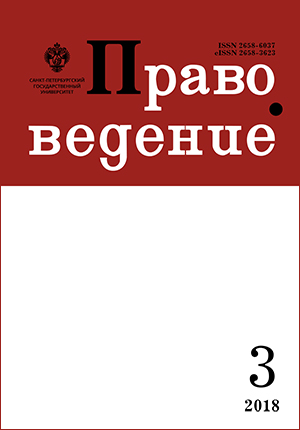On the legal status of the “art” of the artificial intelligence
DOI:
https://doi.org/10.21638/spbu25.2018.307Abstract
The article is dedicated to the issues of protection of artworks, created by the artificial intelligence or with the help of artificial intelligence. The authors of the article analyze the term “artificial intelligence” from the perspective of technologies, legal doctrine and legislation and provide critical comparison of these definitions, basing on which stipulate several key criteria of the definition of artificial intelligence. The article also describe basic principles of the working process of the artificial intelligence systems. Basing on the key criteria, provided as a result of the analysis of the existing definitions of the “artificial intelligence”, the authors generate their own definition of this term. The article also provides detailed analysis of the term “creativity” from the perspective of the objective and subjective approaches. The analysis includes comparison of the process of the creation of the work of art by the human and by the artificial intelligence. The authors question whether it is possible in principle to apply the term “work of art” to the objects created by the artificial intelligence. According to the authors’ point of view, current level of the artificial intelligence technologies does not provide any possibility to apply the term “creativity” to artificial intelligence as the model of the working process of the artificial intelligence is based ultimately on the mathematical algorithms. According to the article, this mean that the objects created by the artificial intelligence or with the help of it do not meet traditional requirements of creativity. The article provide several potential regulation models for the objects created by the artificial intelligence or with the help of it. These models can be broken down as follows: no legal protection is required, public domain model, protection under information law, protection as know-how objects, protection as intellectual property objects. The authors of the article provide comparative analysis of the above-mentioned models of protection, the advantages and disadvantages of each model, give their opinion on the existing and potential legislative initiatives in the sphere of artificial intelligence regulation.
Keywords:
artificial intelligence, copyright, exclusive rights, cyber physical system, law, creative work, know-how, draft law, caselaw, information
Downloads
References
References
Arkhipov, Vladislav, and Naumov, Victor. 2017. Informational and Legal Aspects of the Development of Robotics Regulation. Informatsionnoe pravo, no. 1: 19–27. (In Russian)
Gongalo, Bronislav (ed.). 2018. Civil law. Textbook, vol. 1. 3rd ed. Moscow, Statut Publ. (In Russian)
Gurko, A. 2017. Artificial Intelligence and Copyright: Vision of the Future. Intellectual Property. Copyright and Related Rights 12: 7–18. (In Russian)
Kashanin, A. V. 2007. Creative Nature as a Condition for the Protectability of a work in the Russian and Foreign Copyright Law. Civil Law Review 2: 75–119. (In Russian)
Keisner A., Raffo J., Wunsch-Vincent S. 2016. Robotics: Breakthrough Technologies, Innovation, Intellectual Property. Foresight and STI Governance 10 (2): 7–27.
McCutcheon J. The Vanishing Author in Computer-Generated Works: a Critical Analysis of Recent Australian Case Law. Melbourne University law review. 2013. Accessed August 14, 2018. https://www.researchgate.net/publication/289409001_The_vanishing_author_in_computergenerated_works_A_critical_analysis_of_recent_Australian_case_law/
Morkhat, Pyotr. 2017. Artificial Intelligence: a legal view. Scientific monograph. Moscow, Institute of State-confessional relations and law Publ. (In Russian)
Morkhat, Pyotr. 2018. The system of artificial intelligence as a subject of copyright and patent law. Vestnik Rossiyskoy akademii intellektual’noy sobstvennosti i Rossiyskogo avtorskogo obshchestva 3: 82–92. (In Russian)
Novikov, Fеdor. 2018. Symbolic Artificial Intelligence: Mathematical Foundations of Knowledge Representation. Мoscow, Jurajt Publ. (In Russian)
Novoselova L. A. (ed.). 2017. Intellectual Property Law: textbook. Vol. 2: Copyright. Moscow, Statut Publ. (In Russian) Perevalov, Vadim, and Blinov, Oleg. 2018. Do Androids dream of copyright. Legal insight 4 (70): 27– 32. (In Russian)
Ponkin, Igor V., and Red’kina, Alena I. 2018. Artificial Intelligence from the Point of View of Law. Vestnik Rossijskogo universiteta druzhby narodov. Ser. Juridicheskie nauki 22 (1): 91–109. (In Russian
Downloads
Published
How to Cite
Issue
Section
License
Articles of "Pravovedenie" are open access distributed under the terms of the License Agreement with Saint Petersburg State University, which permits to the authors unrestricted distribution and self-archiving free of charge.




